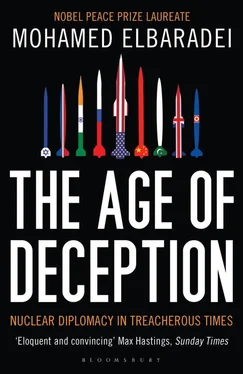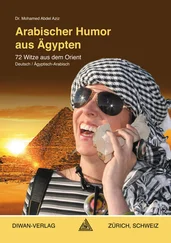The first possibility was that Iran would choose voluntarily to return to zero enrichment, or full suspension. That seemed most unlikely.
The second was that the Iranians could be allowed a small R&D enrichment program, as a face-saving gesture. In return, they could be asked to freeze, for a number of years, their efforts to go to an industrial scale. Iran would also have to allow the IAEA to do robust inspections to be able to verify the absence of undeclared nuclear activities—the most important aspect from a nonproliferation perspective. Iran would have to help resolve any outstanding inspection issues. And they would need to commit themselves to remaining indefinitely a party to the NPT.
The third possibility was the status quo: remaining in the pointless stalemate on negotiations, with the West issuing more resolutions and sanctions as Iran moved steadily toward the threshold of industrial-scale enrichment, without adequate inspection or the Additional Protocol and without clarifying concerns about their past and current programs.
There was a fourth possibility. The radicals in the West might bomb Iran. This would produce Armageddon in the Middle East, a region already volatile and chaotic.
In my view, the only option was the second.
Zapatero and Moratinos were among the leaders who took the emerging threat of a major conflagration very seriously and engaged others—including Massimo D’Alema, the Italian foreign minister, and Jean-Claude Juncker, the prime minister of Luxembourg—to be ready to support any diplomatic initiative that might avoid a clash.
Facing the truth of where we were on the issue seemed important, but my efforts to bring clarity caused tempers to flare. On May 15, 2007, I gave an interview to David Sanger of the New York Times in which I stated that by now Iran had pretty much gained the knowledge to enrich uranium, even if they still needed to perfect it. “People will not like to hear it,” I said, “but that’s a fact.” I added that the purpose of the demand for suspension—which was to deny Iran this knowledge—had been “overtaken by events.”
I repeated the same lines in a long interview with the Spanish news service Grupo Vocento, [8] Interview with Grupo Vocento, by Dario Valcarcel and Borja Bergareche, “Detecto una escalada gradual que aleja una solución pacífica con Irán,” ABC, May 17, 2007.
adding that it was incomprehensible to me that the Americans were ready to talk to the Iranians about security in Iraq but not about “the elephant in the room”—the nuclear issue. I also was critical about the lack of progress on disarmament.
The Americans and the French were furious. Greg Schulte, the U.S. ambassador, dropped by with a message from Rice saying that, to her deep disappointment, my media statements were undercutting the unity of the international community and their diplomatic efforts. I was giving motivation, she said, for those who wanted to use military force.
“Tell Rice,” I said to Schulte, “that I am equally disappointed that she did not understand the purpose of my statements, which is to show that the current strategy is not working and that the opportunity still exists to adjust the strategy.” I laid out for him the four scenarios I envisioned as alternative futures for Iran. The worst possible outcome—the use of force—remained a danger. I referred him to an interview that John Bolton had given the same day to Fox News, in which he implied that the United States might yet take this route. [9] Bolton’s statement: “If you believe, as I do, that Iran is never going to be chatted out of its nuclear weapons, because it sees the nuclear weapons program as its trump card, then the only recourse is to dramatically ratchet up the economic and political pressure on Iran and keep open the option of regime change or even military force.” Interview on Hannity and Colmes, Fox News, May 21, 2007. Retrieved at www.realclearpolitics.com/articles/2007/05/interview_with_john_bolton_on_1.html .
The Americans, Schulte said, did not trust the Iranians. That was pretty obvious, I replied. The United States, he added, needed to maintain its “moral clarity” until Iran abided by the Security Council resolution. It was a poor choice of words; I considered asking when the United States might achieve sufficient “moral clarity” to get rid of its nuclear arsenal, but I said nothing.
As he was about to leave, Schulte hinted that if the Agency was going to be “politicized”—meaning, I assumed, that if I was going to continue to speak in the same vein—Rice had told him the Americans could treat the IAEA budget like that of the Universal Postal Union. The reference was to an argument I frequently made to the Board that Member States should distinguish among UN agencies in terms of their mandates and relative budgetary priorities.
This was a cheap shot, and I told Schulte so. “You are the first ones who have benefited from the Agency,” I declared. “And if Member States decide not to pay their dues, I will be happy to shut the Agency’s doors.”
Two days later, on May 25, Schulte returned with the French and British ambassadors to make a formal demarche. They managed to drag with them a reluctant-looking Japanese deputy ambassador, Shigeki Sumi. [10] The ambassador, Yukiya Amano, to his delight, was traveling and unavailable.
He sat quietly during the entire meeting and later told some colleagues that he was embarrassed but under orders to attend. I suspect the Japanese were recruited as stand-ins for the Germans, who had declined to join in.
The ambassadors repeated the same rhetoric about my public statements: I was dividing the international community and undermining the Security Council and the IAEA Board. The French and the Americans said they also were unhappy about my statements on disarmament, which, according to Schulte, were not part of my mandate. It was my duty, I responded, to advise them from a nonproliferation perspective, and I could see a crisis developing. Additionally, the IAEA Statute charges the Agency with furthering “the establishment of safeguarded worldwide disarmament.” When I spoke at outside forums, I noted, it was not as the IAEA Director General, representing the views of the Board, but as an international public servant. “For ten years,” I said, “I have been drawing attention to the linkage between nuclear proliferation and the sluggish pace of disarmament, and I will continue to do so.”
I reminded Schulte that, when it suited the Americans, as in the case of the U.S.-India nuclear agreement, they referred to me freely as “the custodian of the NPT,” but when I spoke against their arms control policies, my role suddenly narrowed. When the French ambassador, François-Xavier Deniau, insisted that Iran had a nuclear weapons program, I reminded him that, at the time of the inspections in Iraq, he had personally informed me that Iraq had retained “little amounts” of chemical and biological weapons, a claim that turned out to be bogus. He did not respond.
Western alarmism notwithstanding, Iran’s rapid expansion of its enrichment operations, after an extended period of relative restraint, was indeed cause for concern. It signaled a shift: resignation to the fact that the West would not show flexibility or compromise and determination to pursue the nuclear technology that many Iranians viewed as a national achievement. From the Iranian perspective, the acceleration was also probably intended to put pressure on the West to agree on a compromise that would stop short of Iran fully suspending its enrichment program.
My perception was confirmed by Swiss state secretary Michael Ambühl on his return from yet another visit to Tehran. The Iranian position was hardening. Only two months earlier they had been willing to consider freezing enrichment activities at the R&D level for the duration of negotiations. This time Larijani had not been able to commit to any freeze or time-out during negotiations. He seemed willing only to commit not to enrich uranium beyond 5 percent. For the first time, he had mentioned the possibility that Iran might enrich uranium up to 20 percent to meet the fuel needs of its research reactors.
Читать дальше












